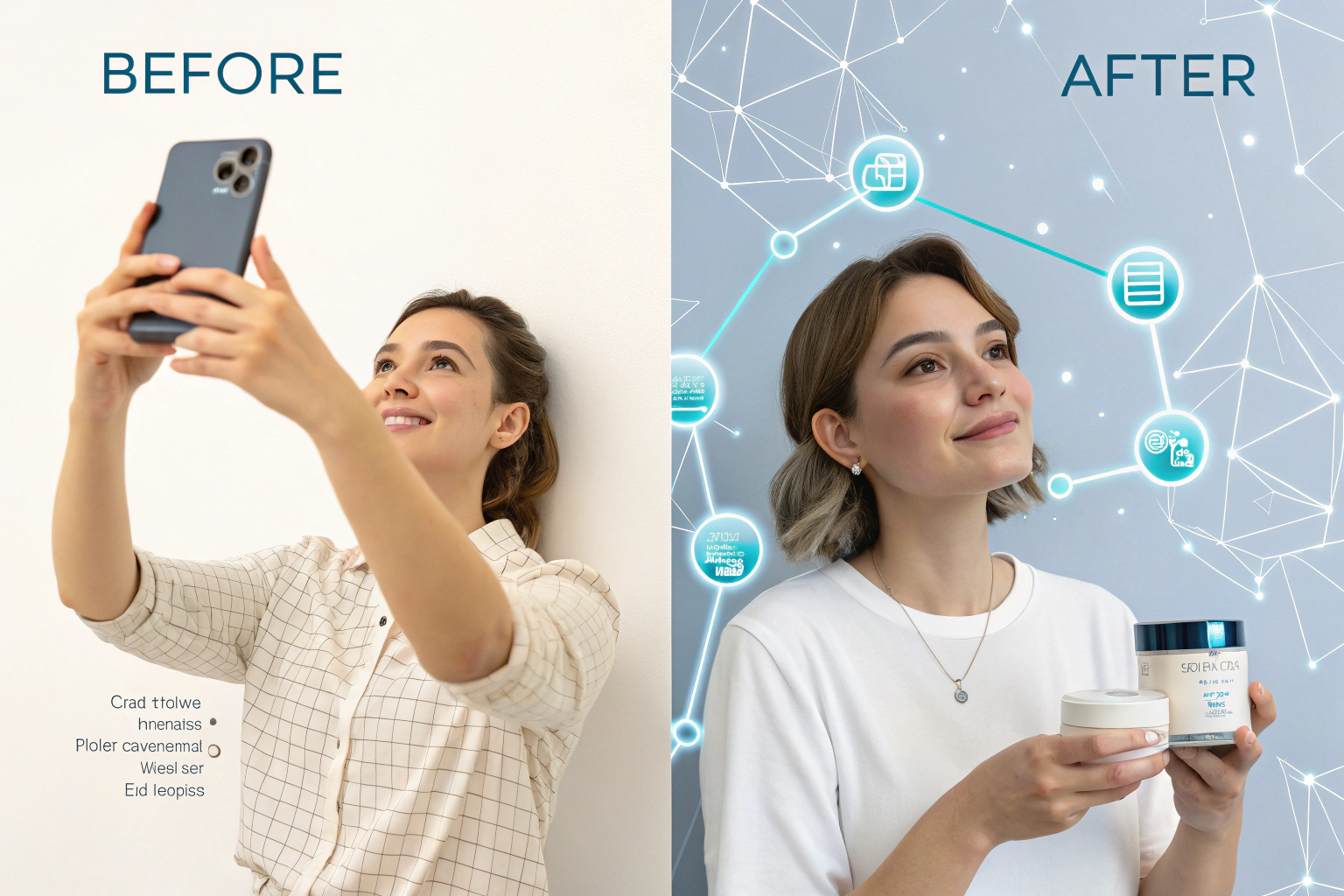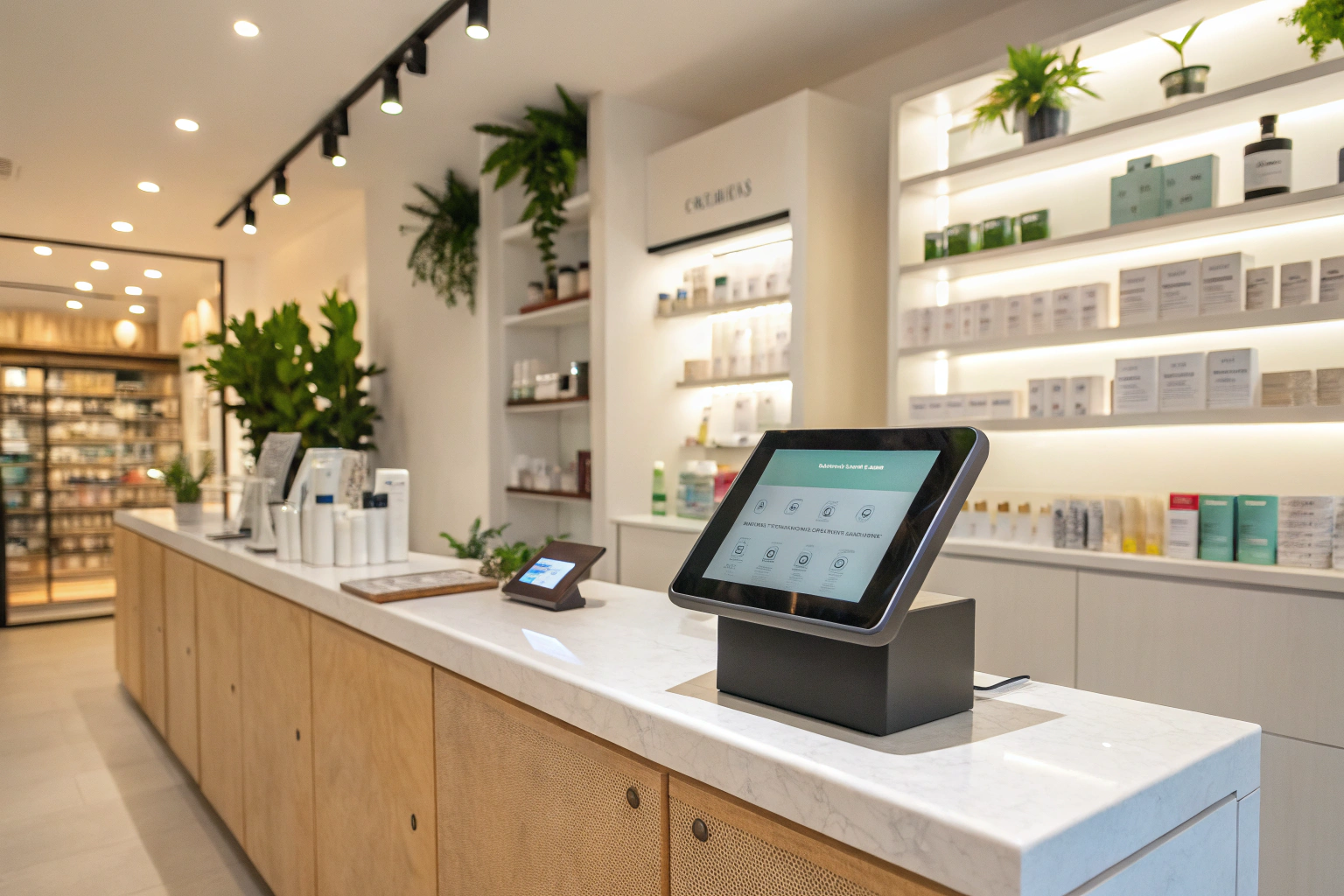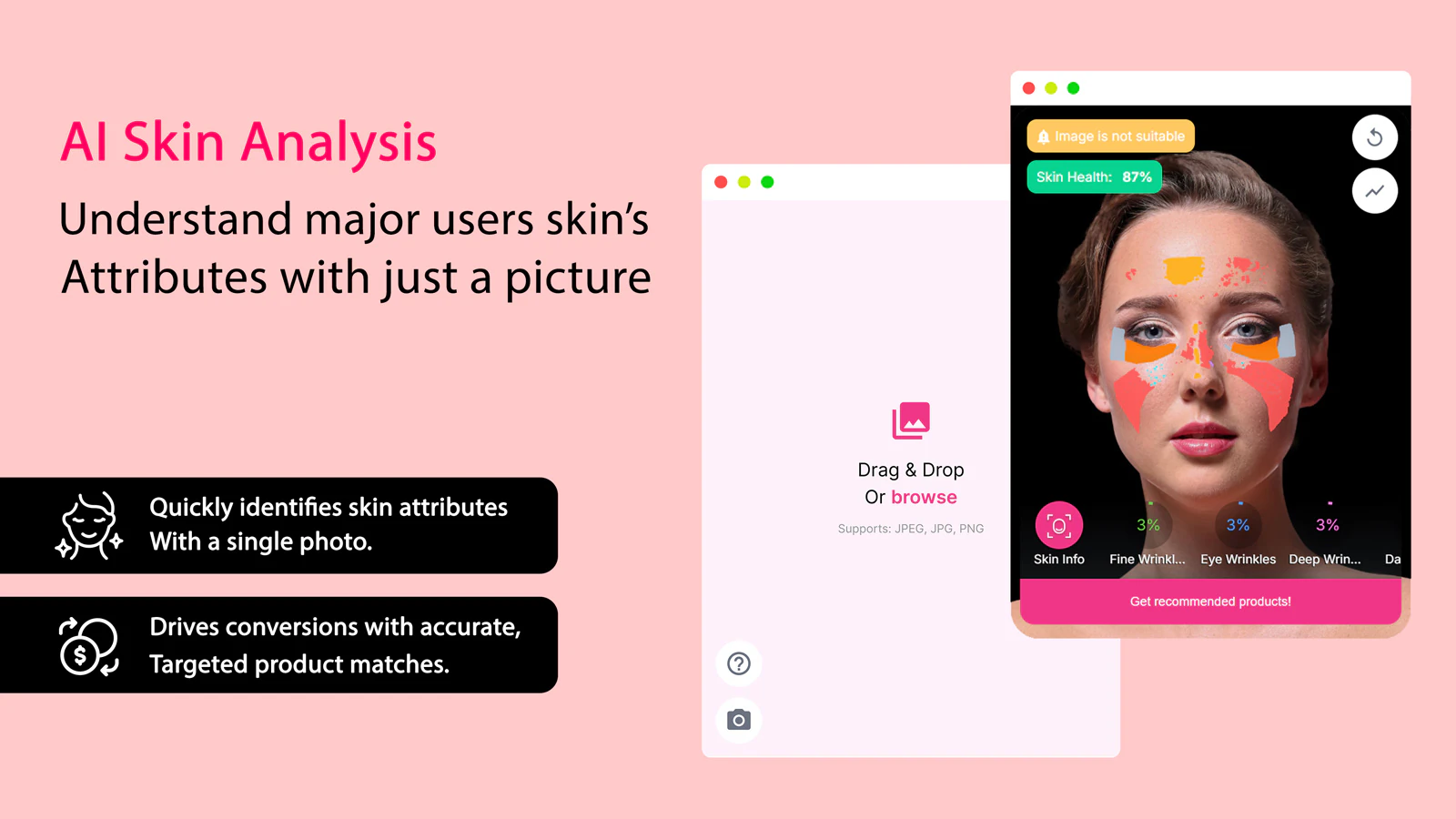

Imagine if, in under two minutes, every customer could receive a complete skincare routine matched to their exact needs, using your products, ready to add to their cart... read more

.png)
.png)

In the evolving world of skincare, personalization has moved from a “nice to have” to a necessity. Shoppers no longer want to guess what might work for their skin, they expect science, speed, and certainty. That’s why AI-powered skin analysis for brands is reshaping how the beauty industry connects with customers.
Let’s dive into how this technology works, why brands are embracing it, and how it's quietly becoming a new standard in beauty.
AI skin analysis tools use computer vision and deep learning to assess skin conditions like acne, fine lines, dryness, pigmentation, and pore size. With just a selfie or short video, users can receive detailed diagnostics in seconds. No appointments. No guesswork.

The most effective tools on the market combine three powerful technologies:
Together, these technologies deliver what traditional consultations often can’t, instant, scalable insights with clinical-level precision.
Whether you're exploring new tech or upgrading your current setup, here’s a helpful overview of the top skin analysis tools used by forward-thinking brands.
From global beauty giants to emerging skincare startups, brands everywhere are integrating AI skin diagnostic tools into their customer journeys. It’s not just about being trendy, it’s about delivering more value to shoppers. Personalization, precision, and performance are driving this shift. Here's why AI is becoming essential for forward-thinking skincare brands.
In a crowded beauty market, personalization is the ultimate differentiator. AI skin diagnostic tools offer brands a way to meet customers where they are, digitally, and recommend routines built around their actual skin needs.
Whether embedded on a brand’s website, offered in-store, or used through a quiz-style interface, these tools turn casual visitors into informed buyers.

The real magic happens post-analysis. Once the AI identifies skin concerns, it can match customers with products that address their specific issues, improving satisfaction and conversion rates. Some tools even generate custom day-and-night skincare routines, turning data into delight.
When customers experience this level of thoughtful personalization, they remember it. It signals that the brand understands them, and is invested in their long-term skin health. Over time, these small tech moments translate into big brand loyalty.
If you’re running your shop on Shopify, it’s worth exploring what qualifies as the best skin analysis app for Shopify stores right now.
While AI skin tools offer a better experience for customers, the benefits on the brand side are just as powerful. From higher accuracy to fewer returns, AI helps brands operate smarter, not harder. This section explores the concrete business advantages of bringing AI into your skincare strategy.
Unlike manual evaluations, AI delivers consistent, objective assessments. This means fewer errors, stronger trust, and better skin care outcomes, especially for online shoppers who can't visit a store.
Speed is everything in e-commerce. With AI tools offering instant results, customers can move from diagnosis to product checkout within minutes, an experience that's not only satisfying but sales-friendly.

With better-fit recommendations, customers are less likely to buy the wrong product. This reduces returns, cuts down waste, and keeps your sustainability goals on track, all while protecting margins.
AI skin analysis isn't just a concept, it’s already shaping customer experiences across the beauty industry. From global giants to innovative, data-driven platforms, these tools are helping brands drive engagement, boost conversions, and build trust with their audiences. Here are a few standout examples:
Cetaphil recently rolled out a tool that evaluates skin conditions via mobile selfie, providing users with a product-matching experience in under a minute. The result? A boost in engagement and more confident shoppers.
L'Oréal's Skin Genius platform combines AI and AR to provide hyper-personalized skin care guidance. Available across devices, it’s helped bridge the gap between in-store and online consultations.
Face Age is helping fast-growing skincare brands unlock AI without needing a massive tech team. Their platform provides facial skin analysis, customized product recommendations, and AI-generated skincare routines that plug directly into online stores like Shopify.
It’s designed to be simple to implement, yet powerful in results, helping smaller and mid-sized brands offer experiences that rival the industry leaders.

From Neutrogena’s Skin360 to Shiseido’s Optune, the shift toward virtual skin analysis is industry-wide. Even boutique brands are now adopting plug-and-play AI solutions that integrate seamlessly with their websites and e-commerce platforms, offering scalable, no-code personalization.
There’s a lot to learn from how other beauty brands are evolving, just take a look at some inspirational skincare stores using Face Age for fresh ideas.
Fortunately, implementing this kind of tech has become easier and more accessible than ever. Whether you're a large retailer or a boutique brand, this section covers the key steps to launch and scale an AI solution effectively.
The success of your AI offering hinges on the partner behind it. Look for platforms that specialize in skincare AI, have dermatology-backed datasets, and provide features like product recommendations, beauty routine generation, and real-time analytics. Many brands opt for platforms that also support integration with Shopify or WooCommerce for ease of setup.
Whether you're selling online or in physical stores, these tools should feel native to your customer journey. Some solutions are designed with plug-in flexibility, allowing them to blend into your website, pop-ups, or consultation flow with minimal tech effort.
.png)
AI in skincare is just getting started. As new trends emerge and consumer expectations evolve, beauty tech is set to become even more interactive, predictive, and personalized. Here’s a look at where things are headed, and how brands can stay ready for what’s next.
AI is no longer just reactive, it’s becoming predictive. Emerging platforms now use trend data and historical inputs to forecast future skin issues or suggest preventive treatments. Combined with AR-powered try-ons, this creates a rich, interactive experience that boosts buyer confidence.
As consumers grow accustomed to smart, tailored experiences in everything from streaming to food delivery, they expect the same from beauty. The AI skin analysis market is projected to grow significantly, and early adopters are already seeing tangible ROI, from higher conversion rates to longer customer retention cycles.
AI-powered skin analysis for brands is more than a trend, it’s a new pillar in the beauty buyer journey. Whether you're a global brand or a fast-growing indie label, implementing AI diagnostic tools can unlock next-level personalization, reduce returns, and elevate customer trust.
Want to stay ahead of the beauty tech curve? Explore how leading skincare shops are using AI to personalize routines, boost conversions, and enhance every step of the customer journey.
1. How does AI skin analysis actually work?
AI skin analysis uses facial recognition and deep learning algorithms to scan a customer’s face, identify skin concerns like dryness, wrinkles, or acne, and provide personalized recommendations. It's fast, non-invasive, and more consistent than manual consultations.
2. Can small skincare stores afford to use AI technology?
Yes. Many AI skin analysis tools, including Face Age, are built for small to mid-sized skincare shops. They’re easy to integrate with platforms like Shopify, and they scale with your business.
3. What kind of results can I expect after adding AI skin analysis to my shop
Stores often see higher engagement, more conversions, and better customer retention. Personalized recommendations build trust, and customers are more likely to return when they feel understood.
4. Is AI skin analysis only useful for online stores?
Not at all. Both online and in-person skincare businesses can benefit. In-store kiosks or tablets can offer on-the-spot skin analysis, while online quizzes with AI support create a seamless digital experience.
5. What’s the best way to get started with AI skin analysis?
Start by exploring tools that match your platform (like Shopify), and look for ones that are easy to customize.
Lorem ipsum dolor sit amet, consectetur adipiscing elit. Suspendisse varius enim in eros elementum tristique. Duis cursus, mi quis viverra ornare, eros dolor interdum nulla, ut commodo diam libero vitae erat. Aenean faucibus nibh et justo cursus id rutrum lorem imperdiet. Nunc ut sem vitae risus tristique posuere.
Who has used Face Age in their online shop and enjoyed it?
.png)
.png)